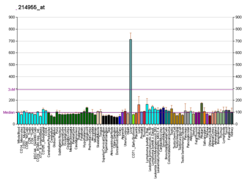Transmembrane protease, serine 6 (also known as matriptase-2) is an enzyme that in humans is encoded by the TMPRSS6 gene.
Based on twin studies, mutations in TMPRSS6 gene have a correlation with iron deficiency predisposition.
The protein encoded by this gene is a type II transmembrane serine proteinase that is found attached to the cell surface. The encoded protein may be involved in matrix remodeling processes in the liver.
References
- ^ GRCh38: Ensembl release 89: ENSG00000187045 – Ensembl, May 2017
- ^ GRCm38: Ensembl release 89: ENSMUSG00000016942 – Ensembl, May 2017
- "Human PubMed Reference:". National Center for Biotechnology Information, U.S. National Library of Medicine.
- "Mouse PubMed Reference:". National Center for Biotechnology Information, U.S. National Library of Medicine.
- ^ "Entrez Gene: TMPRSS6 transmembrane protease, serine 6".
- An P, Wu Q, Wang H, et al. TMPRSS6, but not TF, TFR2 or BMP2 variants are associated with increased risk of iron-deficiency anemia. Hum Mol Genet. 2012;21(9):2124-2131.
Further reading
- Netzel-Arnett S, Hooper JD, Szabo R, et al. (2004). "Membrane anchored serine proteases: a rapidly expanding group of cell surface proteolytic enzymes with potential roles in cancer". Cancer Metastasis Rev. 22 (2–3): 237–58. doi:10.1023/A:1023003616848. PMID 12784999. S2CID 21824244.
- Ramsay AJ, Reid JC, Velasco G, et al. (2007). "The type II transmembrane serine protease matriptase-2--identification, structural features, enzymology, expression pattern and potential roles" (PDF). Front. Biosci. 13 (13): 569–79. doi:10.2741/2702. PMID 17981570. S2CID 5578120.
- Dunham I, Shimizu N, Roe BA, et al. (1999). "The DNA sequence of human chromosome 22". Nature. 402 (6761): 489–95. Bibcode:1999Natur.402..489D. doi:10.1038/990031. PMID 10591208.
- Velasco G, Cal S, Quesada V, et al. (2002). "Matriptase-2, a membrane-bound mosaic serine proteinase predominantly expressed in human liver and showing degrading activity against extracellular matrix proteins". J. Biol. Chem. 277 (40): 37637–46. doi:10.1074/jbc.M203007200. PMID 12149247.
- Strausberg RL, Feingold EA, Grouse LH, et al. (2003). "Generation and initial analysis of more than 15,000 full-length human and mouse cDNA sequences". Proc. Natl. Acad. Sci. U.S.A. 99 (26): 16899–903. Bibcode:2002PNAS...9916899M. doi:10.1073/pnas.242603899. PMC 139241. PMID 12477932.
- Clark HF, Gurney AL, Abaya E, et al. (2003). "The secreted protein discovery initiative (SPDI), a large-scale effort to identify novel human secreted and transmembrane proteins: a bioinformatics assessment". Genome Res. 13 (10): 2265–70. doi:10.1101/gr.1293003. PMC 403697. PMID 12975309.
- Ota T, Suzuki Y, Nishikawa T, et al. (2004). "Complete sequencing and characterization of 21,243 full-length human cDNAs". Nat. Genet. 36 (1): 40–5. doi:10.1038/ng1285. PMID 14702039.
- Collins JE, Wright CL, Edwards CA, et al. (2005). "A genome annotation-driven approach to cloning the human ORFeome". Genome Biol. 5 (10): R84. doi:10.1186/gb-2004-5-10-r84. PMC 545604. PMID 15461802.
- Gerhard DS, Wagner L, Feingold EA, et al. (2004). "The status, quality, and expansion of the NIH full-length cDNA project: the Mammalian Gene Collection (MGC)". Genome Res. 14 (10B): 2121–7. doi:10.1101/gr.2596504. PMC 528928. PMID 15489334.
- Rual JF, Venkatesan K, Hao T, et al. (2005). "Towards a proteome-scale map of the human protein-protein interaction network". Nature. 437 (7062): 1173–8. Bibcode:2005Natur.437.1173R. doi:10.1038/nature04209. PMID 16189514. S2CID 4427026.
- Hartikainen JM, Tuhkanen H, Kataja V, et al. (2006). "Refinement of the 22q12-q13 breast cancer--associated region: evidence of TMPRSS6 as a candidate gene in an eastern Finnish population". Clin. Cancer Res. 12 (5): 1454–62. doi:10.1158/1078-0432.CCR-05-1417. PMID 16533768.
- Parr C, Sanders AJ, Davies G, et al. (2007). "Matriptase-2 inhibits breast tumor growth and invasion and correlates with favorable prognosis for breast cancer patients". Clin. Cancer Res. 13 (12): 3568–76. doi:10.1158/1078-0432.CCR-06-2357. PMID 17575220.
This article on a gene on human chromosome 22 is a stub. You can help Misplaced Pages by expanding it. |




